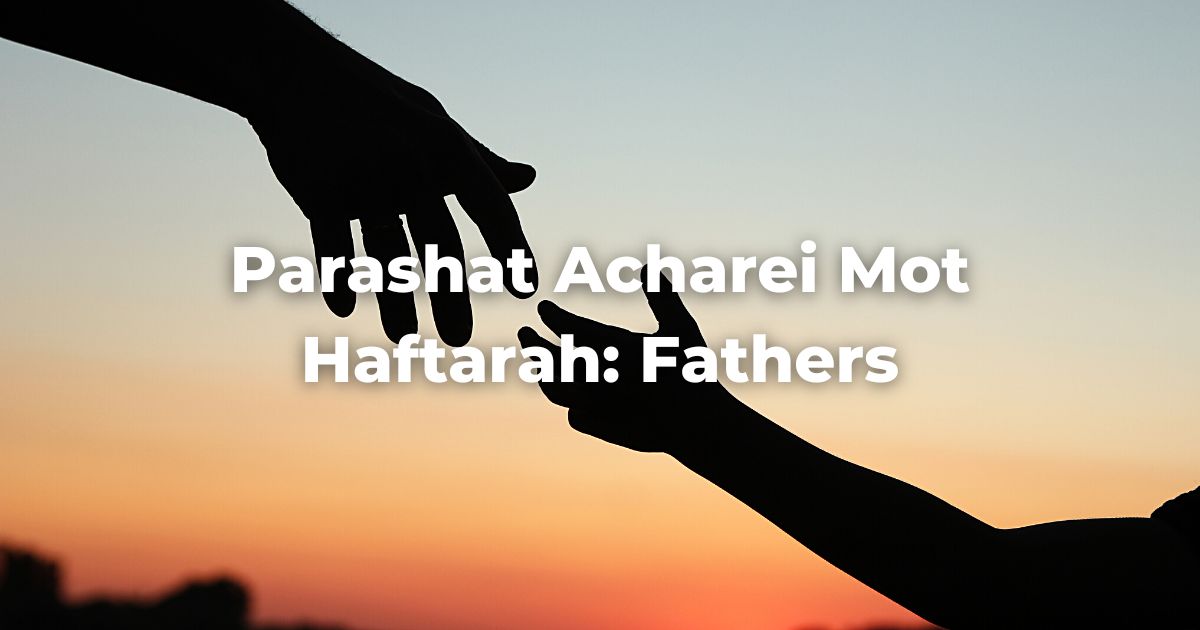This week, we read 1 Samuel 20, the story of Jonathan helping David escape from King Saul, in conjunction with Parashat Achrei Mot.
This Haftarah’s connection to the parashah and Rosh Chodesh
We read the David story because it is the haftarah for shabbatot on which the following day is Rosh Chodesh, the first day of the new month and this haftarah features the phrase “machar hodesh,” “tomorrow is the start of the month.”
But this haftarah also happens to be a good companion to the parashah this week. Both feature fathers whose sons have moved past them.
Aaron’s sons haunt this week’s parashah.
The parashah begins with Moses speaking to Aaron “after the death of his two sons when they drew close to God and died.” His sons, Nadav and Avihu, had offered a strange fire as a sacrifice and had been consumed because of it.
They had tried to perform their father’s duties, but slightly differently.
It ended catastrophically.
Aaron was not permitted to grieve at that time but had to keep being functional, serving as first high priest to the Israelite nation. We get glimpses of the grief he felt, but for the most part we see only his public face, Aaron as high priest rather than Aaron as father.
The haftarah offers a retelling of this theme.
In the role of Aaron, the first high priest, we have Saul, the first king of Israel. In the role of Aaron’s sons, we have Saul’s son, Jonathan. And in the role of agent of God, played by the consuming fire in Aaron’s story, we have David in Saul’s story.
This time, we watch Saul lose his son, his heir, slowly and painfully. We are privy to the ways it destroys him even as he tries to maintain his public facing persona.
Although Saul is a doomed king, with God having rescinded support for his kingship, he refuses to act like one. Most important to Saul is ensuring that his kingship will become a dynasty, that his son will rule after him. But Jonathan, his son, refuses to be the sort of heir apparent that his father demands.
Rather, Jonathan chooses to follow David, who Saul sees as a threat to both of them and as a usurper of the throne. Jonathan rejects the methods of his father much the same way as Nadav and Avihu had rejected the strict instructions given to Aaron about how to approach the altar and what was permissible there.
Saul’s reactions
Saul tries to eliminate David, to remove this threat to Jonathan’s succession to the throne. Jonathan refuses to play along. And it drives Saul mad.
At a festival that Saul throws, David does not show up. Saul questions Jonathan as to David’s absence, knowing that his big-hearted son does not realize how dangerous it is to befriend someone like David. When Jonathan explains that he has given permission to David not to be there, Saul loses it.
He sees the self-destructive impulse in Jonathan’s behavior.
He knows that to allow David to live and to thrive is to destroy Jonathan.
We read Saul’s words, as translated by Robert Alter, “O, son of a perverse wayward woman! Don’t I know you have chosen the son of Jesse to your own shame and the shame of your mother’s nakedness? For as long as the son of Jesse lives on the earth, you and your kingship will not be unshaken! And now, send and fetch him to me, for he is a dead man!”
When Jonathan refuses, Saul tries to kill Jonathan.
He has been so consumed by his fear of losing his son to his rival that he does lose control of himself and try to kill his own son.
Eventually, Saul’s paranoia overwhelms him completely. He loses all sense of right and wrong, real and make believe. He no longer can function as king at all.
We never see Aaron like this. We see his resolve, his silence. But perhaps Saul’s story can help us to hear the pain that Aaron as high priest could never permit himself to show.
Originally published in 2022.
See more: Parashat Acharei Mot
Originally posted as part of the Conservative Yeshiva at the Fuchsberg Jerusalem Center’s Torah Sparks. Support TorahRefers to the first five books of the Hebrew Bible, the Tanakh, also called the Five Books of Moses, Pentateuch or the Hebrew equivalent, Humash. This is also called the Written Torah. The term may also refer to teachings that expound on Jewish tradition. Read more learning from the Fuchsberg Jerusalem Center/Conservative Yeshiva for leaders and seekers around the world here.
Authors
-

Bex Stern Rosenblatt is the Conservative Yeshiva’s Faculty-in-Residence for the Mid-Atlantic Region of the United States, teaching Tanach, using the techniques of close-reading, theater, feminist readings, and traditional commentators. Bex also directs the CY’s recruitment efforts in North America. After finishing her B.A. in History and German at Williams College, Bex received a Fulbright Grant to Austria. She later earned an M.A. in TanakhAn acronym for the name of the Hebrew Bible: Torah, Neviim, and Ketuvim. Read more from Bar Ilan University and has also studied at the Conservative Yeshiva and Bina Jerusalem. Bex is the founder of HavrutaA study partner. A hevruta is more than just a ‘study buddy’ it is a serious and personal relationship between colleagues. Also spelled: Havruta Read more Tel Aviv, an organization that facilitates guided pair-learning of the Tanakh.
View all posts -



The Fuchsberg Jerusalem Center (FJC) is a home in the heart of Jerusalem where leaders and seekers can find an authentic place in Jewish tradition to call their own. FJC offers opportunities to study, pray and explore within an egalitarian and inclusive setting, creating multiple pathways for finding personal and communal meaning.
View all posts






